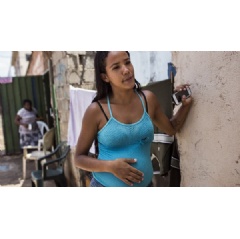Social science research: a much-needed tool for epidemic control
To control epidemics, it’s essential to understand the contexts where they take place. Social researchers are helping to uncover ethical and practical challenges that are critical to the people caught in the middle of an outbreak.
Zika introduced further burdens to families, often single mothers, already living in poor conditions. Research contributed to the introduction of crucial support structures.
In the past five years, the world has faced severe epidemic outbreaks that have caused immense damage.
Some captured the media headlines – such as the West African Ebola outbreak which killed more than 11,000 people, the Zika outbreak in Brazil which affected more than 107,000 people, mothers and babies, and the ongoing Ebola outbreak in the Democratic Republic of the Congo (DRC).
Others are less talked about – such as MERS-CoV in Saudi Arabia, cholera in Zimbabwe and measles in Japan.
Learning about a virus – and the people affected by itWe’re used to thinking about the biological research needed to understand and control epidemics. It’s during outbreaks that we learn most about what causes a disease, and test new vaccines, drugs and diagnostic tools.
But an epidemic is a social phenomenon as much as is a biological one, so understanding people’s behaviours and fears, their cultural norms and values, and their political and economic realities is essential too.
“Having social research alongside epidemic scientific research allows for more effective scientific research because it really helps to explain the human factor in the epidemic, not just the cells and the disease,” says Dr Patricia Kingori, Senior Investigator at the Wellcome Centre for Ethics and Humanities and the Ethox Centre, University of Oxford.
Humanities and social science researchers play a crucial role in epidemic preparedness and response. Their studies provide insight into the social context of outbreaks. This knowledge can help us to adapt and improve our response to outbreaks.
Uncovering the ‘unseen’ challengesDuring the current Ebola outbreak in DRC, with the support of Wellcome and the Department for International Development (DFID), researchers based at the Social Science in Humanitarian Action Platform have produced a set of briefs that are used by WHO, UNICEF and health authorities across the world.
These briefs (opens in a new tab) have helped shape the response on the ground by highlighting operational problems and practices that frame the social experience of epidemics. For example, the briefs look at burial practices and suggest ways for health emergency responders to conduct safe and dignified burials.
Wellcome and DFID also funded Professor Debora Diniz to conduct a study in the Brazilian Alagoas state during the 2015 Zika outbreak. Diniz investigated the experiences of living with Zika (opens in a new tab) and caring for babies affected by Zika congenital syndrome. Her work not only shows that poverty and Zika are closely linked, but also that Zika introduced further burdens to families, often single mothers, already living in poor conditions.
And her investigations highlighted that many children and parents were excluded from social safety nets. Working with state and federal governments, Diniz contributed to the introduction of crucial support structures for the families affected.
The Zika outbreak also gave new visibility to the systematic exclusion of pregnant women from research. Drug manufacturers and instructional review boards have been reluctant to include pregnant women in clinical trials, leaving a large population group without access to potentially life-saving treatments and vaccines.
During the Zika outbreak in Brazil, multiple teams of researchers started developing vaccine candidates, but felt they couldn’t conduct clinical trials to test them. A team, led by Professor Ruth Faden, developed guidance for including pregnant woman and their babies in Zika vaccine research. Since then, the team have created more far-reaching recommendations (opens in a new tab), setting out to address the needs of pregnant women in public health preparedness, vaccine research and development, and the use of vaccines during epidemics.
After the ‘end’ of an outbreakOn 14 January 2016, WHO declared the end of the biggest Ebola outbreak to date. After almost two years, international health teams began to close the Ebola treatment centres in Sierra Leone, Liberia and Guinea – and the epidemic was officially over.
But not for those left behind. People who had lost family and friends continued to grieve; local staff who had worked in the treatment centres and volunteers had who worked in the crematoriums, often with little compensation for their time and dedication, couldn’t forget the bodies. Their stories after the end of Ebola remained largely unknown.
In one project, Dr Kingori and her colleague, Dr Catherine McGowan, have collected stories (opens in a new tab) in an effort to understand what the end of an outbreak actually means for the local communities. They are now working on publishing their findings.
And the Ebola 100 Project (opens in a new tab), led by Dr Sharon Abramowitz, captures the voices of Ebola responders who worked to end the outbreak during 2013-2016. These include health workers, community leaders, humanitarians and academics who worked at a local, national or international level
Together, these testimonies highlight how messy ‘the end of a disease (opens in a new tab)’ can really be, and how outbreaks leave legacies that endure beyond their official ‘end date’.
Researchers hope that their work will lead to new guidelines and policies to ensure that volunteers and healthcare workers who help during an outbreak are thought about carefully, even after the global health community declares the outbreak over.
Our aim should be that such policies and guidelines are as much part of the way we prepare and respond to epidemics as guidelines for how to conduct clinical trials or sequence viruses in the field.
( Press Release Image: https://photos.webwire.com/prmedia/7/232542/232542-1.jpg )
WebWireID232542
This news content was configured by WebWire editorial staff. Linking is permitted.
News Release Distribution and Press Release Distribution Services Provided by WebWire.

